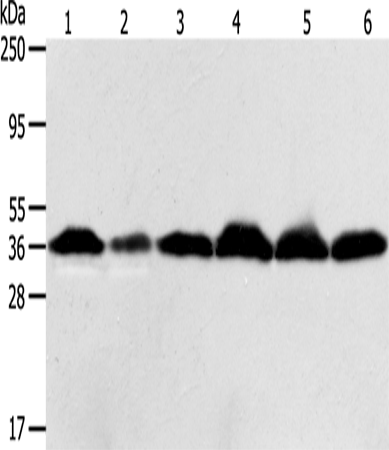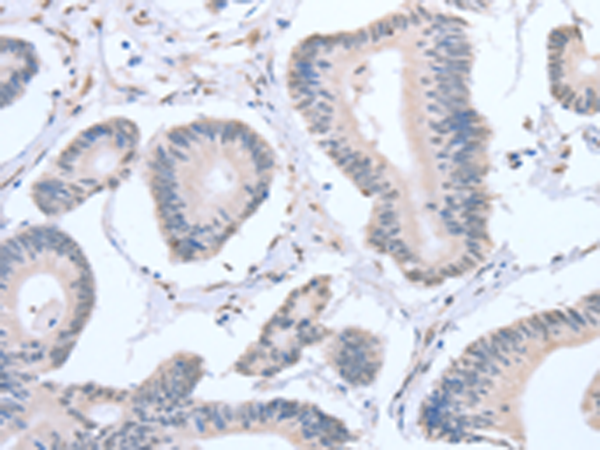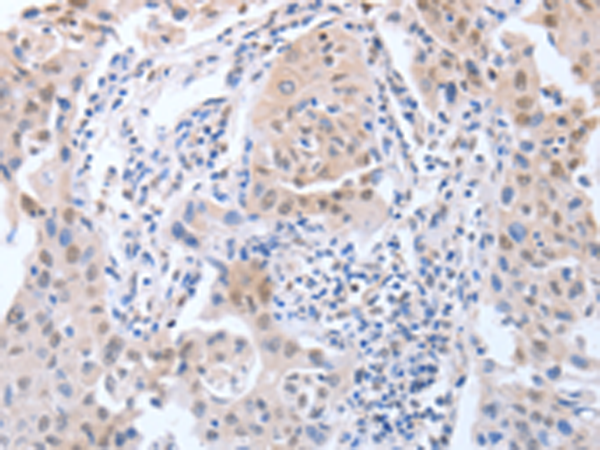


| WB | 咨询技术 | Human,Mouse,Rat |
| IF | 咨询技术 | Human,Mouse,Rat |
| IHC | 1/15-1/50 | Human,Mouse,Rat |
| ICC | 技术咨询 | Human,Mouse,Rat |
| FCM | 咨询技术 | Human,Mouse,Rat |
| Elisa | 1/2000-1/5000 | Human,Mouse,Rat |
| Aliases | APE; APX; APE1; APEN; APEX; HAP1; REF1 |
| WB Predicted band size | 36 kDa |
| Host/Isotype | Rabbit IgG |
| Antibody Type | Primary antibody |
| Storage | Store at 4°C short term. Aliquot and store at -20°C long term. Avoid freeze/thaw cycles. |
| Species Reactivity | Human, Mouse, Rat |
| Immunogen | Fusion protein of human APEX1 |
| Formulation | Purified antibody in PBS with 0.05% sodium azide and 50% glycerol. |
+ +
以下是3篇关于APEX1抗体的参考文献及其摘要概括:
1. **"Characterization of a Novel Monoclonal Antibody Against Human APEX1 for DNA Repair Studies"**
- 作者:S. Yamamoto et al.
- 摘要:本研究开发了一种针对人源APEX1蛋白的新型单克隆抗体,通过Western blot和免疫荧光验证其特异性,并证明其在检测细胞核内APEX1定位及DNA氧化损伤修复机制中的适用性。
2. **"APEX1 Overexpression in Colorectal Cancer: Validation by Immunohistochemistry Using a Commercial Antibody"**
- 作者:M. Chen et al.
- 摘要:文章利用市售APEX1抗体(货号abXXXX)对结直肠癌组织进行免疫组化分析,证实APEX1在肿瘤中高表达且与患者预后不良相关,强调了该抗体在临床病理研究中的可靠性。
3. **"Role of APEX1 in Neuronal Oxidative Stress: Insights from Knockout Mouse Models and Antibody-Based Detection"**
- 作者:R. Patel & J. Harper
- 摘要:通过APEX1基因敲除小鼠模型,结合特异性抗体(兔多克隆,Sigma-Aldrich)进行蛋白表达分析,揭示APEX1在神经元氧化应激应答中的关键作用及其与神经退行性疾病的潜在关联。
4. **"Comparative Analysis of APEX1 Antibodies for ChIP-seq Applications in Epigenetic Research"**
- 作者:K. Lee et al.
- 摘要:系统比较了多种市售APEX1抗体在染色质免疫沉淀(ChIP)中的效能,筛选出适用于研究APEX1与DNA修复相关表观遗传调控的高效抗体,为相关领域提供技术参考。
以上文献涵盖了抗体开发、癌症研究、神经科学及技术方法优化等方向,可供APEX1功能与应用研究参考。
APEX1 (Apurinic/apyrimidinic endodeoxyribonuclease 1), also known as APE1 or Ref-1. is a multifunctional enzyme critical for DNA repair and redox regulation. It primarily functions in the base excision repair (BER) pathway, where it cleaves the DNA backbone at abasic (AP) sites generated by DNA glycosylases, enabling error-free repair of damaged bases. Additionally, APEX1 acts as a redox-sensitive chaperone, modulating the DNA-binding activity of transcription factors such as HIF-1α, p53. and NF-κB by reducing oxidized cysteine residues. Its dual role in maintaining genomic stability and regulating cellular responses to oxidative stress underscores its importance in cancer, neurodegeneration, and aging.
APEX1 antibodies are essential tools for studying these processes. They are widely used in techniques like Western blotting, immunohistochemistry, and immunofluorescence to detect APEX1 expression, localization, and dynamics in cells and tissues. These antibodies often target specific epitopes, such as the N-terminal redox domain or the C-terminal endonuclease region, enabling functional studies. Validated APEX1 antibodies are crucial for exploring its role in diseases; for example, upregulated APEX1 in tumors is linked to chemoresistance, while its deficiency correlates with neurodegenerative conditions. Researchers also utilize APEX1 antibodies to investigate post-translational modifications (e.g., phosphorylation, acetylation) that regulate its activity. High-quality, specificity-tested antibodies are vital to ensure accurate experimental outcomes, advancing both basic research and therapeutic targeting of APEX1-related pathways.
×